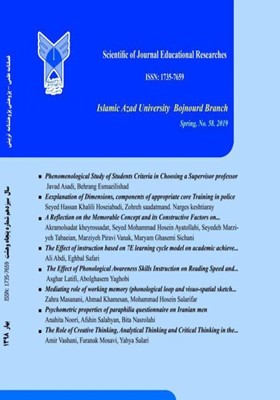A Reflection on the Memorable Concept and its Constructive Factors on Architecture Schools
Subject Areas : Educational ScienceAkramolsadat Kheyrossadat 1 , Seyd Mohammad Hosein Ayatollahi 2 , Marziye Tabaeian 3 , Marziyeh Piravi Vanak 4 , Maryam Ghasemi sichani 5
1 - Phd Student, Department of Architecture, Isfahan (Khorasgan) Branch, Islamic Azad University.Isfahan. Iran
2 - Department of Architecture, ّFaculty of Art and Architecture. yazd University, Yazd. Iran
3 - Department of Architecture, Isfahan (Khorasgan) Branch, Islamic Azad University, isfahan, Iran
4 - Department of Art Research, Faculty of Research Excellence in Art and Entrepreneurship. Art University of Isfahan, Isfahan. Iran
5 - Department of Architecture, Isfahan (Khorasgan) Branch, Islamic Azad University, Isfahan. Iran
Keywords: Grounded Theory, Architectural Education, Field Architecture,
Abstract :
In order to illustrate the introduction of identifying identity factors in the context and architecture of a new angle, in this paper, the "grounded theory ", which is one of the qualitative research methods, has been used. To prove the effectiveness of this method, the Yazd school of architecture was selected as a case study to explain the step-by-step explanation of the implementation stages of this research. Participants in this study were composed of 20 graduated architects from the Yazd school of architecture, who were selected using a snowball method ". Data analysis was carried out based on three methods of coding: open coding, axial coding and selective coding. The categorization of concepts, and the discovery of relationships between components and the emergence of dimensions took place. Finally, according to Strauss and Corbin, qualitative research validation methods were applied in this study. The findings of this research were organized in the final stage in the paradigmatic model as follows: 1.Casual Variables. 2. Context variables. 3. Intervening variables 4. Core Category or Phenomenon 5. Strategies. 6.Consequences. The results of this study suggest that by aligning the goals of academic education with the implementation of the architecture on the one hand and recognizing the values of the identity of the evaluator to the location, on the other hand, it is possible to integrate correctly the hidden and discovered capabilities of the educational body in order to educate the territorial architect it was the most important consequence of this study.
_||_


